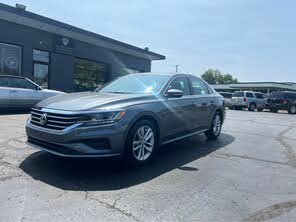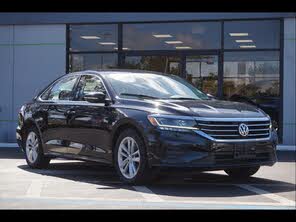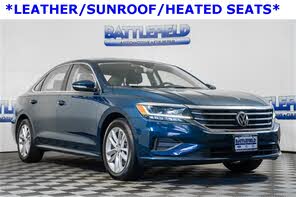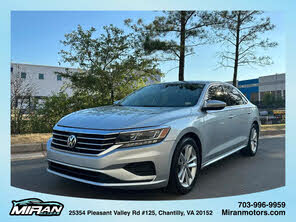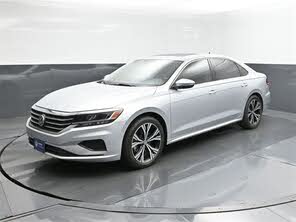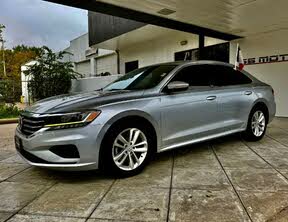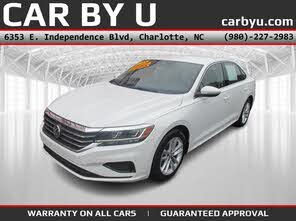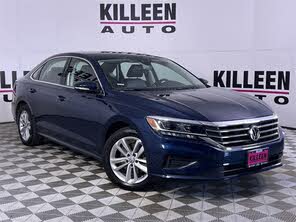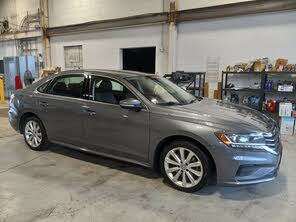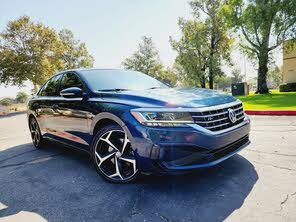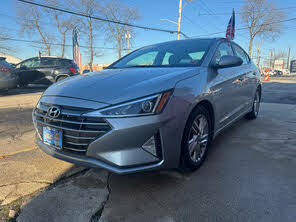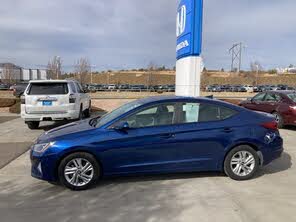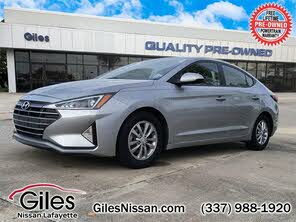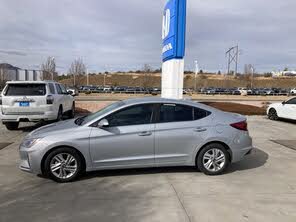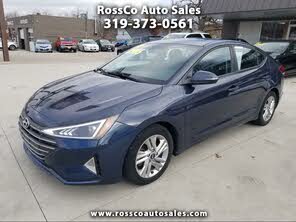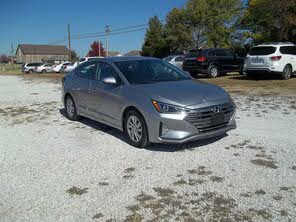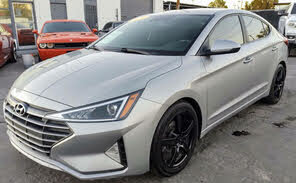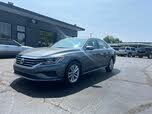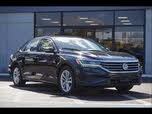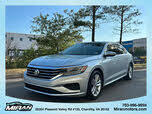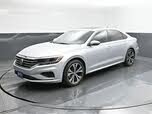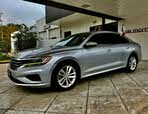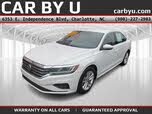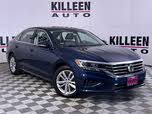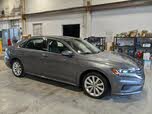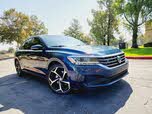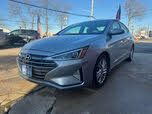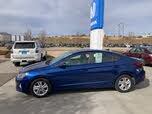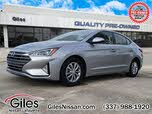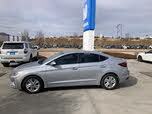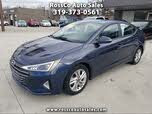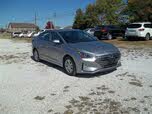2020 Volkswagen Passat vs 2020 Hyundai Elantra
Overview | |
MSRP$22,995 | MSRP$19,300 |
Average price$17,060 | Average price$14,639 |
Listings303 | Listings1502 |
Ratings & Reviews | |
User Reviews | User Reviews |
Expert reviews8.0 out of 10 | Expert reviews8.3 out of 10 |
Pros
| Pros
|
2020 Volkswagen Passat Reviews SummaryVolkswagen builds a full-size car in Chattanooga, Tennessee, and has for nearly a decade. It’s called the Passat, and it gets a restyle for 2020. Huge inside like a full-size automobile, priced like a midsize sedan, and thrifty with gas like a compact car, the Passat has long been one of my favorite family haulers. Unfortunately, what it needs is a redesign, not a restyle. But since consumers want SUVs instead of sedans and VW is about to roll out a squadron of electric vehicles, the company couldn’t make a business case for spending a pile of cash to craft a new gas-powered car. Instead, you get the old one wearing a new suit. | |
2020 Hyundai Elantra Reviews SummaryHyundai isn’t pulling any punches when it comes to the compact car segment, where value is of utmost importance. And though a completely redesigned 2021 Elantra is coming soon, the automaker bestows several value-enhancing improvements upon the outgoing 2020 Hyundai Elantra compact sedan. They include free scheduled maintenance, improved fuel economy ratings, and new standard safety features. | |
No video found | |
Popular Features & Specs | |
Engine2.0L 174 hp I4 | Engine2.0L 147 hp I4 |
Drive TrainFWD | Drive TrainFWD |
Seating Capacity5 | Seating Capacity5 |
Horsepower174 hp @ 5200 rpm | Horsepower147 hp @ 6200 rpm |
MPG City23 | MPG City31 |
MPG Highway34 | MPG Highway41 |
Engine | |
Engine Name2.0L 174 hp I4 | Engine Name2.0L 147 hp I4 |
Torque206 lb-ft @ 1700 rpm | Torque132 lb-ft @ 4500 rpm |
Horsepower174 hp @ 5200 rpm | Horsepower147 hp @ 6200 rpm |
DrivetrainFWD | DrivetrainFWD |
Fuel Economy | |
MPG City23 | MPG City31 |
MPG Highway34 | MPG Highway41 |
Interior | |
Seating Capacity5 | Seating Capacity5 |
Safety | |
Front Crash Overall4 | Front Crash Overall4 |
Side Crash Overall5 | Side Crash Overall4 |
Dimensions & Capacity | |
Cargo Space15.9 cu ft | Cargo Space14.4 cu ft |
Curb Weight3325 lbs | Curb Weight2844 lbs |
Height58.0 in | Height56.5 in |
Length193.6 in | Length181.9 in |
Width72.2 in | Width70.9 in |
Wheelbase110.4 in | Wheelbase106.3 in |
Maximum Payload926 lbs | Maximum Payload1080 lbs |
Number of doors4 | Number of doors4 |
Overview | ||
MSRP | $22,995 | $19,300 |
Average price | $17,060 | $14,639 |
Listings | ||
Ratings & Reviews | ||
User reviews | ||
Expert reviews | 8.0 out of 10Read full review | 8.3 out of 10Read full review |
Pros & cons | Pros
| Pros
|
Summary | Volkswagen builds a full-size car in Chattanooga, Tennessee, and has for nearly a decade. It’s called the Passat, and it gets a restyle for 2020. Huge inside like a full-size automobile, priced like a midsize sedan, and thrifty with gas like a compact car, the Passat has long been one of my favorite family haulers. Unfortunately, what it needs is a redesign, not a restyle. But since consumers want SUVs instead of sedans and VW is about to roll out a squadron of electric vehicles, the company couldn’t make a business case for spending a pile of cash to craft a new gas-powered car. Instead, you get the old one wearing a new suit. | Hyundai isn’t pulling any punches when it comes to the compact car segment, where value is of utmost importance. And though a completely redesigned 2021 Elantra is coming soon, the automaker bestows several value-enhancing improvements upon the outgoing 2020 Hyundai Elantra compact sedan. They include free scheduled maintenance, improved fuel economy ratings, and new standard safety features. |
Video | No video found | |
Popular Features & Specs | ||
Engine | 2.0L 174 hp I4 | 2.0L 147 hp I4 |
Drive Train | FWD | FWD |
Seating Capacity | 5 | 5 |
Horsepower | 174 hp @ 5200 rpm | 147 hp @ 6200 rpm |
MPG City | 23 | 31 |
MPG Highway | 34 | 41 |
Engine | ||
Engine Name | 2.0L 174 hp I4 | 2.0L 147 hp I4 |
Torque | 206 lb-ft @ 1700 rpm | 132 lb-ft @ 4500 rpm |
Horsepower | 174 hp @ 5200 rpm | 147 hp @ 6200 rpm |
Drivetrain | FWD | FWD |
Fuel Economy | ||
MPG City | 23 | 31 |
MPG Highway | 34 | 41 |
Interior | ||
Seating Capacity | 5 | 5 |
Safety | ||
Front Crash Overall | 4 | 4 |
Side Crash Overall | 5 | 4 |
Dimensions & Capacity | ||
Cargo Space | 15.9 cu ft | 14.4 cu ft |
Curb Weight | 3325 lbs | 2844 lbs |
Height | 58.0 in | 56.5 in |
Length | 193.6 in | 181.9 in |
Width | 72.2 in | 70.9 in |
Wheelbase | 110.4 in | 106.3 in |
Maximum Payload | 926 lbs | 1080 lbs |
Number of doors | 4 | 4 |
The 2020 Volkswagen Passat bore a striking resemblance to its predecessors from 2012 to 2019, as well as the recently redesigned VW Jetta. It adopted Jetta's styling cues, giving it a familiar yet refreshed look. Inside, the Passat's dashboard retained the architectural T-square design of the previous model, featuring a modest 6.3-inch touchscreen infotainment screen. The interior was dominated by cheap, glossy plastic, which, while easy to clean, lacked a premium feel. However, the Passat was easy to use, drive, and maintain, making it a practical choice for many.
In contrast, the 2020 Hyundai Elantra, last redesigned in 2017 and restyled in 2019, maintained its bold, geometric-influenced appearance. The Elantra Limited test vehicle featured a black paint job that highlighted its angular headlight, fog light, and wheel designs, complemented by chrome detailing. Inside, the Elantra's interior was updated to offer a more upscale look, with silver trim on various elements. Despite the improvements, hard and glossy plastics reminded occupants that it was still a mainstream compact car.
The 2020 Volkswagen Passat was equipped with a turbocharged 2.0-liter 4-cylinder engine, producing 174 horsepower and 206 pound-feet of torque. It ran on regular gas and featured a 6-speed automatic transmission powering the front wheels. The Passat's powertrain was simple, with a Sport transmission setting and paddle shifters. The car's torque allowed it to accelerate smoothly, though the transmission occasionally upshifted too eagerly. The Passat averaged 26 mpg, just shy of the EPA's 27-mpg rating. Its steering was light yet precise, and the brakes were effective, though the suspension tuning left much to be desired, resulting in a busy ride over sharp bumps and a floaty feel over undulations.
The 2020 Hyundai Elantra offered a base 147-horsepower, 2.0-liter four-cylinder engine paired with a new continuously variable transmission (CVT). The Elantra Eco model featured a turbocharged 1.4-liter engine with 128 horsepower and a seven-speed dual-clutch automatic transmission (DCT), achieving 36 mpg in combined driving. The Elantra Sport trim boasted a 1.6-liter turbo four-cylinder engine with 201 horsepower and 195 lb-ft of torque, along with an independent rear suspension for improved handling. The Elantra Limited test car, with its 2.0-liter engine and CVT, provided a smooth driving experience, though it fell short of its fuel efficiency claims, averaging 29.3 mpg. The Elantra's torsion beam axle rear suspension detracted from its ride and handling, making it less enjoyable to drive compared to the Sport trim.
The 2020 Volkswagen Passat was designed with American consumers in mind, offering a spacious interior with wide, comfortable seats and ample room for five passengers. The car featured sizable cupholders, plenty of storage bins, and excellent outward visibility. Cloth upholstery was standard in the Passat S, while the SE and R-Line trims had V-Tex leatherette seats, and the SEL trim offered genuine leather. The Passat's trunk provided 15.9 cubic feet of space, with a flat load floor for maximum utility.
The 2020 Hyundai Elantra, one of the roomier compact cars, comfortably accommodated four adults, with a fifth person fitting in for short trips. The Limited test car included power driver's seat adjustment, leather upholstery, and a sliding center console armrest. All Elantras came with a dual-zone automatic climate control system, though rear air conditioning vents were not available. The Elantra's trunk offered 14.4 cubic feet of space, nearly matching some midsize sedans. An interior grab handle inside the trunk lid made it easy to close.
The 2020 Volkswagen Passat lacked Volkswagen's latest infotainment system and Digital Cockpit instrumentation, featuring a 6.3-inch touchscreen display instead. However, it included App Connect with Apple CarPlay and Android Auto, HD and SiriusXM satellite radio, a CD player, and Bluetooth. The SEL trim added navigation and a Fender premium sound system. The Passat's infotainment system was simple and user-friendly, with physical buttons and knobs. The test car also had an optional remote engine start system and parking steering-assist system exclusive to the SEL trim.
The 2020 Hyundai Elantra came standard with a touchscreen infotainment system, Bluetooth, and a USB port. The base SE trim had a 5-inch screen, while the SEL trim featured a 7-inch display with Apple CarPlay, Android Auto, and SiriusXM satellite radio. The Value Edition included a complimentary subscription to Blue Link Connected Car and Remote plans for three years. The Limited trim added wireless smartphone charging and a premium Infinity sound system, with the Ultimate Package increasing the screen size to 8 inches and adding navigation and Blue Link services. The Elantra's infotainment system was user-friendly, with shortcut buttons and knobs for easy navigation.
The 2020 Volkswagen Passat came equipped with a comprehensive suite of safety features, including forward-collision warning with pedestrian detection, automatic emergency braking, blind-spot warning, and rear cross-traffic warning. An automatic post-collision braking system was also standard. The Passat SE added adaptive cruise control and lane-keeping assist, while the SEL trim included parking assist sensors and adaptive headlights. The Passat earned a top rating of Good from the Insurance Institute for Highway Safety (IIHS).
The 2020 Hyundai Elantra featured Hyundai Smart Sense, a collection of advanced driving assistance systems (ADAS) that included forward-collision warning, automatic emergency braking, lane departure warning, lane-keeping assist, and a driver attention monitor. The SEL trim added blind-spot warning and rear cross-traffic alert, while the Limited and Sport trims included full LED headlights with automatic high-beam operation. The Ultimate Package for the Limited trim added adaptive cruise control, pedestrian detection, and Safe Exit Assist. The Elantra earned a Top Safety Pick from the IIHS when equipped with full LED headlights and received a four-star overall rating from the National Highway Traffic Safety Administration (NHTSA).
CarGurus highlights

According to CarGurus experts, the overall rating for the 2020 Volkswagen Passat is 8.0 out of 10, while the 2020 Hyundai Elantra scores 8.3 out of 10. Based on these ratings, the 2020 Hyundai Elantra is the better choice, offering a more modern design, advanced technology features, and a variety of powertrain options to suit different driving preferences.
Choose the 2020 Volkswagen Passat if:
- You prioritize a spacious interior with ample room for passengers and cargo.
- You prefer a simple, user-friendly infotainment system with physical buttons and knobs.
- You value a comprehensive suite of standard safety features.
Choose the 2020 Hyundai Elantra if:
- You want a compact car with a stylish, updated exterior and interior.
- You seek a variety of powertrain options, including a fuel-efficient Eco model and a sporty Sport trim.
- You appreciate advanced technology features, such as wireless smartphone charging and a premium sound system.
CarGurus highlights

According to CarGurus experts, the overall rating for the 2020 Volkswagen Passat is 8.0 out of 10, while the 2020 Hyundai Elantra scores 8.3 out of 10. Based on these ratings, the 2020 Hyundai Elantra is the better choice, offering a more modern design, advanced technology features, and a variety of powertrain options to suit different driving preferences.
Choose the 2020 Volkswagen Passat if:
Shop Now- You prioritize a spacious interior with ample room for passengers and cargo.
- You prefer a simple, user-friendly infotainment system with physical buttons and knobs.
- You value a comprehensive suite of standard safety features.
Choose the 2020 Hyundai Elantra if:
Shop Now- You want a compact car with a stylish, updated exterior and interior.
- You seek a variety of powertrain options, including a fuel-efficient Eco model and a sporty Sport trim.
- You appreciate advanced technology features, such as wireless smartphone charging and a premium sound system.

By: CarGurus + AI
At CarGurus, our team of experienced automotive writers remain at the heart of our content operation, conducting hands-on car tests and writing insightful guides that are backed by years of industry experience. To complement this, we are harnessing AI to make our content offering more diverse and more helpful to shoppers than ever. To achieve this, our AI systems are based exclusively on CarGurus content, ratings and data, so that what we produce is both unique to CarGurus, and uniquely helpful to car shoppers.












